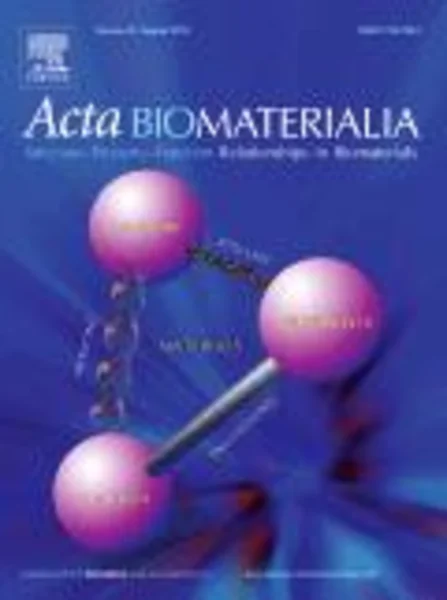-
the effect of autoclaving on the physical and biological properties of dicalcium phosphate dihydrate bioceramics: brushite vs. monetite
جزئیات بیشتر مقاله- تاریخ ارائه: 1392/01/01
- تاریخ انتشار در تی پی بین: 1392/01/01
- تعداد بازدید: 769
- تعداد پرسش و پاسخ ها: 0
- شماره تماس دبیرخانه رویداد: -
dicalcium phosphate dihydrate (brushite) is an osteoconductive biomaterial with great potential as a bioresorbable cement for bone regeneration. preset brushite cement can be dehydrated into dicalcium phosphate anhydrous (monetite) bioceramics by autoclaving. this heat treatment results in changes in the physical characteristics of the material, improving in vivo bioresorption. this property is a great advantage in bone regeneration; however, it is not known how autoclaving brushite preset cement might improve its capacity to regenerate bone. this study was designed to compare brushite bioceramics with monetite bioceramics in terms of physical characteristics in vitro, and in vivo performance upon bone implantation. in this study we observed that monetite bioceramics prepared by autoclaving preset brushite cements had higher porosity, interconnected porosity and specific surface area than their brushite precursors. in vitro cell culture experiments revealed that bone marrow cells expressed higher levels of osteogenic genes runx2, opn, and alp when the cells were cultured on monetite ceramics rather than on brushite ones. in vivo experiments revealed that monetite bioceramics resorbed faster than brushite ones and were more infiltrated with newly formed bone. in summary, autoclaving preset brushite cements results in a material with improved properties for bone regeneration procedures.
مقالات جدیدترین رویدادها
-
استفاده از تحلیل اهمیت-عملکرد در ارائه الگوی مدیریت خلاقیت سازمانی و ارائه راهکار جهت بهبود
-
بررسی تاثیر ارزش وجوه نقد مازاد بر ساختار سرمایه شرکت های پذیرفته شده در بورس اوراق بهادار تهران
-
بررسی تأثیر سطح افشای ریسک بر قرارداد بدهی شرکت های پذیرفته شده در بورس اوراق بهادار تهران
-
بررسی تأثیر رتبه بندی اعتباری مبتنی بر مدل امتیاز بازار نوظهور بر نقد شوندگی سهام با تأکید بر خصوصی سازی شرکت ها
-
تأثیر آمیخته بازاریابی پوشاک ایرانی بر تصویر ذهنی مشتری پوشاک ایرانی (هاکوپیان)
-
بررسی شیوع سوء مصرف مواد و سوء استفاده جنسی و میزان عزت نفس کودکان کار و خیابان شهرستان کرج سال 1393
-
بررسی عملکرد لرزه ای سیستم دوگانه قاب خمشی بتنی و دیوار برشی بتنی با شکل پذیری متوسط / مطالعه موردی: مجتمع تجاری اسپانتا
-
ارزیابی حاشیه ایمنی ساختمان های بتنی قاب خمشی ویژه در ارتفاع متوسط با توزیع نامتقارن سختی در پلان در برابر فرو ریزش
-
تحلیلی بر تأثیر تزئینات خطی مساجد بر مخاطب با تکیه بر اندیشه تیتوس بورکهارت (نمونه موردی: مسجد جامع اصفهان)
-
bioelectrical impedance vector analysis (biva) in slovak population: application in a clinical sample
مقالات جدیدترین ژورنال ها
-
مدیریت و بررسی افسردگی دانش آموزان دختر مقطع متوسطه دوم در دروان کرونا در شهرستان دزفول
-
مدیریت و بررسی خرد سیاسی در اندیشه ی فردوسی در ادب ایران
-
واکاوی و مدیریت توصیفی قلمدان(جاکلیدی)ضریح در موزه آستان قدس رضوی
-
بررسی تاثیر خلاقیت، دانش و انگیزه کارکنان بر پیشنهادات نوآورانه کارکنان ( مورد مطالعه: هتل های 3 و 4 ستاره استان کرمان)
-
بررسی تاثیر کیفیت سیستم های اطلاعاتی بر تصمیم گیری موفق در شرکتهای تولیدی استان اصفهان (مورد مطالعه: مدیران شرکتهای تولیدی استان اصفهان)
-
ویژگی زنان برتر از دیدگاه اسلام با تأکید بر آیه 5 سوره تحریم
-
بررسی رابطه بین چرخه عمر و اجتناب از مالیات شرکت های پذیرفته شده در بورس اوراق بهادار تهران
-
تعیین و ارزیابی عملکرد لرزه ای ساختمان های بتنی
-
evaluation and simulation of new roundabouts traffic parameters by aimsun software
-
evaluation of glycemic control indices in children with type 1 diabetes being treated




سوال خود را در مورد این مقاله مطرح نمایید :